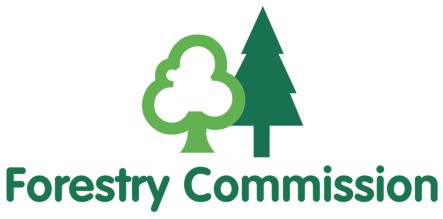Woods into Management Forestry Innovation Funds: successful projects 2023
Published 23 November 2023
Regional Woodland Restoration Funds
The Diverse Regeneration Company CIC
Project title: New Nursery Models Toolkit
Project summary
Production of an adaptable business toolkit for start-up tree nurseries. The toolkit will include financial, regulatory, technical, and business planning information.
Evolving Forests
Project title: Wood Measure
Project summary
This project aims to build and test a platform of linked apps that enable woodland owners and managers to effectively understand and monitor the condition of their woodland. The project will test how data from digital tools could move between platforms to make the condition of woodland and the management planning a more seamless and accessible process. This will enable the creation of woodland management plans focused on woodland conditions.
The Carbon Community
Project title: Drone based measurement and verification of standing timber and carbon volumes
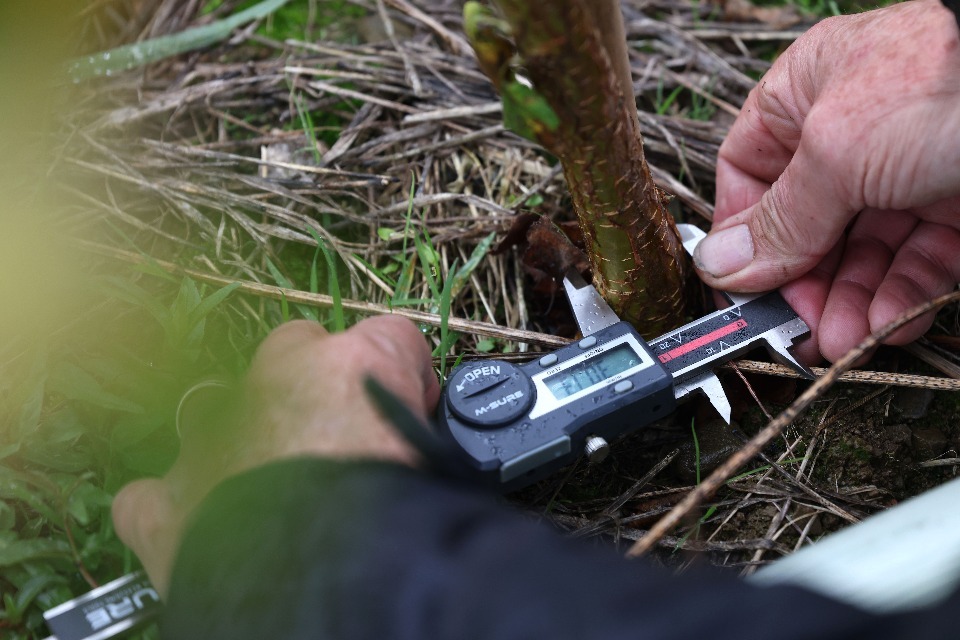
Carbon Community. Credit: Paul Box
Project summary
Researching new ways of using drone technology to measure and monitor growth, health, and carbon sequestration in young forests, both conifer and broadleaf. The project will compare trees measured manually on the ground by volunteers with data collected by drones using multiple sensors.
Trees will be located individually using high accuracy satellite positioning systems to correlate the manual and drone data sets. In addition to measurements, indicators of tree productivity and condition will also be captured.
Grown in Britain
Project title: Remote Sensing Woodland Benefits
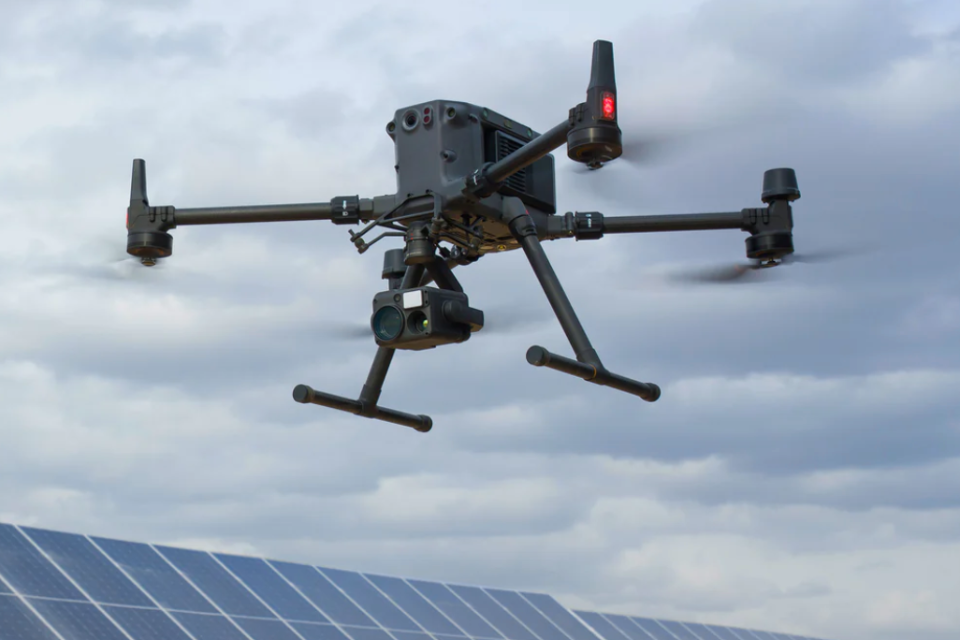
Credit: Grown in Britain
Project summary
This project connects the space, forestry, and technology sectors to trial remote sensing techniques to observe and verify woodland assets/threats including carbon, timber, biodiversity, pests, and disease.
Current auditing of new and existing woodlands and associated habitats including the assets they yield, for example; carbon, timber, and biodiversity, are largely monitored through ‘boots on the ground’ techniques. The use of satellites, crewed planes, Drones, LiDAR, Multispectral, thermal detection, machine learning and artificial intelligence are used in sister sectors but only partially in forestry and ecosystems management.
This project will blend these remote sensing techniques to provide more detailed and informative data for woodland managers, auditors, blended finance, and regulators.
The evidence gathered will, in turn, enable greater investments through benchmarking, monitoring, and the measurement of a wider range of data sets, with more accuracy, depth, and regularity. The aim is to aid the management and development of woodlands and their natural assets.
Soil Association
Project title: Whole Farm Tree Plans
Project summary
This project will develop and test a ‘Whole Farm Tree Plan’ (WFTP) that enables farmers to better understand the benefits of woodland and trees as part of their farm enterprise. Using this entry point to farmer engagement around woodland management and trees on-farm, is a key innovation that the project will be testing.
The current myForest tool operated by Sylva Foundation will be developed as a prototype to allow better mapping and planning of the wider tree resources on-farm, such as hedgerows and agroforestry features. The project will also support the development of farm woodland and agroforestry outcome indicators and measures for the Soil Association Exchange (SAX) platform; a farmer-facing sustainability assessment, improvement, and reward approach.
Penfolds Woodland Management
Project title: Successful Woodland Management Plans and Forest Practices
Project summary
This project seeks to extend the ‘Forestry for non-Foresters – Management Plans and Practices’ workshops to two new regions. Workshop events aim to demystify woodland management through field-based learning structured around the creation of a woodland management plan.
A mentoring visit by a local agent will be available to owners who require follow up support to help course participants take their woodland management forwards.
The National Coppice Federation
Project title: More Coppice into Productive Management
Project summary
This Project has been extended to include two new regions (East of England & East Midlands and Yorkshire & North East region), as well as the existing South West region.
The project will improve the current understanding of where coppice woodland is located and its condition and restorability. It aims to:
- improve understanding of the barriers to coppice management/restoration and landowner needs
- produce a publicly available interactive web-based summary map of coppice woodland
- produce coppice management/restoration information resources for landowners
- establish regional coppice project offices to co-ordinate further action
- produce a final project report to include recommendations for further action and support
In turn, this project aims to:
i) move more coppice woodland into active productive management in line with the UK Forestry Standard
ii) improve woodland condition, biodiversity, resilience, provision of ecosystem services
ii) bring more local coppice products into the supply chain to meet existing market pull.
Timber in Construction Forestry Innovation Fund
Evolving Forests
Project title: Sharing value chain stories, facilitating change
Project summary
This project aims to stimulate markets for English timber by deepening connections across the supply chain. Evolving Forests will use their knowledge of the timber value-chain to explain construction to foresters; forestry to construction; and forestry and construction to policy influencers. Rich visuals and media will be used to bring stakeholders together.
Material Cultures
Project title: Clearfell House
Project summary
In partnership with the University of the Arts London, Material Cultures are installing a high-quality demonstrator to host workshops and showcase the potential of a holistic integration of forestry and construction.
Alongside the building’s ability to host school children, higher education workshops and adult learning programmes, the space will be a flagship demonstrator building for the North-East and Yorkshire Local Enterprise Partnership’s (LEP) new Circular Biobased Construction Working Group, driving forward demand for a more circular and sustainable building industry.
Open Systems Lab
Project title: One Hundred Factories: Unlocking the collective capacity of local timber Modern Methods of Construction (MMC) manufacturers
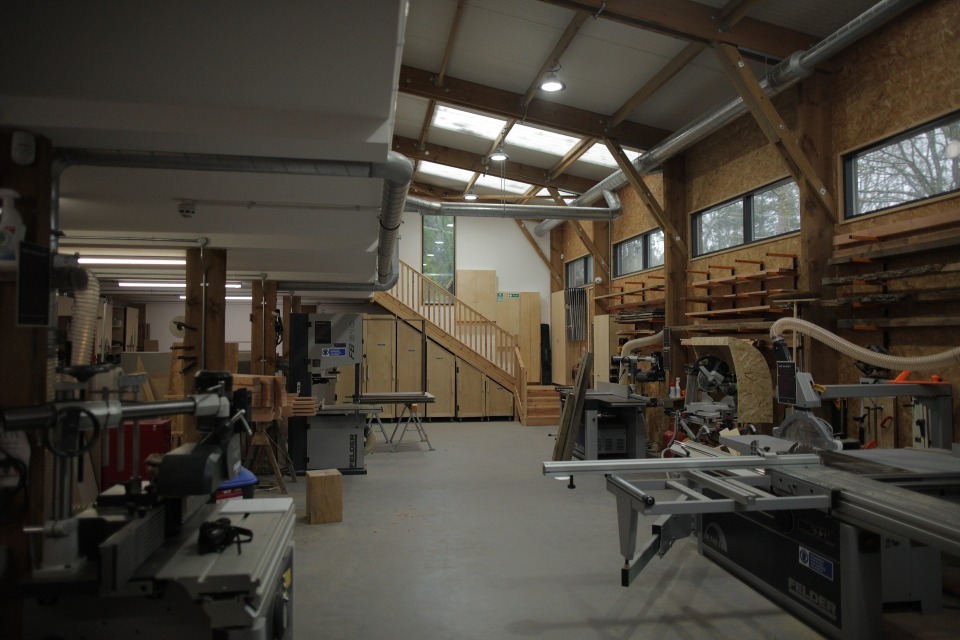
Open Systems Lab
Project summary
This project will develop digital and productive infrastructures necessary for manufacturing modular timber building kits via a distributed supply chain of small and medium-sized enterprises. The project aims to increase the adoption and traceability of home-grown WikiHouse blocks in the residential construction sector, accelerating the UK’s transition to circular, zero-carbon building technologies.
WeCanMake
Project title: Multi-Max: a pre-approved maximum timber “Kit of Parts” for multi-storey multi-occupancy residential buildings
Project summary
The aim of this project is to create a standardised and replicable homegrown timber “Kit-of-Parts” construction system for multi-storey and multi-occupancy residential buildings.
This project aims to demonstrate how low-carbon English timber can safely and affordably replace traditional high-carbon construction materials such as concrete and steel. The Kit-of-Parts will be developed and tested through applying it to three urban infill sites in Bristol, creating a real-world demonstrator of what is possible with English timber.
Architype Architects
Project title: Safe Timber Schools
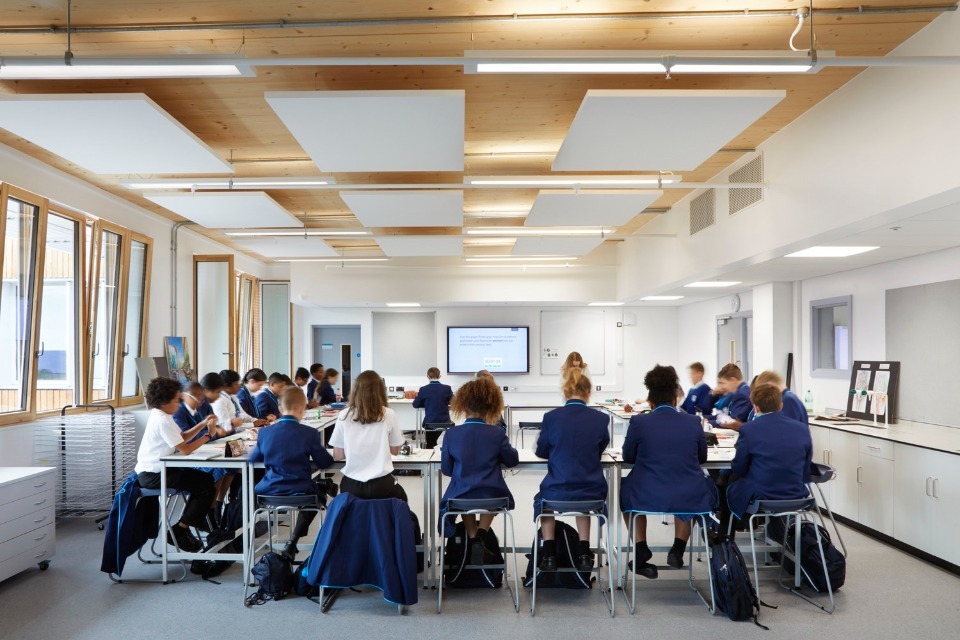
Architype Architects. Credit: Jack Hobhouse
Project summary
Development of a new, holistic method for demonstrating fire safety with timber-framed primary schools. The project will use available UK grown timber products for structure and insulation in a highly replicable, and tried and tested system that delivers Passivhaus energy performance and low embodied carbon outcomes.
Team members also include University College London (UCL), University of Edinburgh, IGNIS, PYC group, Lowfield Timber Frames, Wood Knowledge Wales.”
New Model Institute for Technology and Engineering
Project title: Commercialisation of homegrown woodfibre insulation
Project summary
The aim of this project is to optimise the combination of English-grown hardwood and softwood, alongside suitable binders, and additives, for the manufacture of commercially viable homegrown wood fibre insulation, at scale, for use in the built environment.
The project will review the current supply chain capability, develop quality management systems for the manufacture of homegrown woodfibre insulation, and pilot manufacture small scale samples to determine thermal, acoustic, and fire performance.
Routes to Market for Ash Timber Forestry Innovation Fund
Gather Design Ltd
Project title: Re-Imagining UK Ash Furniture Manufacture & Supply
Project summary
The Gather Design project aims to re-imagine British furniture manufacturing by developing a collaborative network of local makers producing honest, accessible, low impact furniture within 60 miles of customers’ homes. Created from homegrown timbers, supporting the regeneration of native woodlands, as a new route to market for English Ash.
Drawing on a legacy of British furniture from Chippendale to G Plan, Gather Design will create an inspiring new blueprint for environmentally sound homewares production that transforms the marketplace. This novel collaborative approach will rebuild the UK’s cabinetry skills, improve local economies and encourage more native woodlands into management. Trust and transparency is at the heart of our new way.
